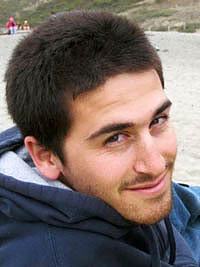This week’s Dvar Tzedek was originally published in 2009.
Acharei Mot, Kedoshim. After Death, Holy. The mysterious yet evocative sound of the titles of this double parshah uttered together hints at the relationship between darkness and luminescence. It reveals a tension between two dimensions of the human experience: our potential for fallibility and distance from divinity, and our potential for virtue and closeness to divinity. The opening passages of these parshiyot accentuate this provocative dissonance. Parashat Acharei Mot begins:
We immediately confront death, tied to a realization that we are not godly. In contrast, Parashat Kedoshim opens: “YHWH spoke to Moses, saying: Speak to the whole Israelite community and say to them: You shall be holy, for I, YHWH, am holy.”[2] We can be holy like the Divine.
These portrayals of humanity seem utterly contradictory, but from the depths of these contradictions there emerges a clear path of personal growth. When we open ourselves to darkness—when we honestly look upon mortality, suffering and failure, in ourselves and in our world—we can elevate ourselves to higher planes. After Death, Holy.
Yom Kippur, a main focus of Parashat Acharei Mot,[3] beckons us to face the existential truth of our mortality and estrangement from divinity. The very concept of an annual Day of Atonement exposes us to sobering mirrors. It reminds us that we quite helplessly slip into carelessness, corruption and insensitivity, separating us further from the Divine. We are commanded to practice “self denial”[4] on this day, and our consequent waves of humbling hunger remind us just how human and near to death we are.
When we fail to respond to suffering in the world, when we do not help people who are in dire need, our estrangement from divinity increases. According to Jewish law, we are obligated to help people in danger whenever we are aware of their predicament.[5] In our age of globalization, when so much information is literally at our fingertips, we cannot plead ignorance. As long as we squander twenty-dollar bills that could otherwise purchase enough maize to feed a family for six months in Ethiopia[6] or a flock of chicks for a family in Cameroon, we are guilty.[7] As long as starvation, persecution and death from preventable diseases abound in our world, we are not entirely blameless. When we bury our heads in the sand in order to avoid feelings of responsibility, we are nonetheless responsible for these acts of omission.
Our destructive acts of commission are an even more serious matter. We increase global injustice through our actions. For example, as long as we buy coffee, clothes and electronics from companies that exploit workers in the Global South, we are personally culpable. When we speak or behave in ways that undermine women, homosexuals, the financially disadvantaged or any other marginalized people, we feed forces of oppression in the world.
Parashat Acharei Mot forcefully directs our consciousness to the fact that we will inevitably mess up again and again, eclipsing divinity in our lives. This disturbing reality is why the practice of Yom Kippur is chukat olam[8]—a law for all time, for all the world. We are only human. To face this complicated truth is tantamount to facing death itself. Yet these parshiyot remind us that human culpability is just the beginning of a sacred journey.
After Death, Holy.
The Torah teaches that we, despite our inadequacies, have the capacity to be holy. Although holiness is difficult for us to conceptualize, Parashat Kedoshim suggests that it has everything to do with righteousness, justice and generosity. We are commanded to be honest in our dealings,[9] to feed the poor[10] and to treat disempowered people with dignity.[11] Coming on the heels of Parashat Acharei Mot’s discussion of Yom Kippur, Parashat Kedoshim suggests that serious introspection can stimulate ethical and spiritual growth.
The inspiring view of humanity in Parashat Kedoshim is not an alternative, per se, to the disillusioning view in Parashat Acharei Mot. This pair of paradigms reflects an evolution of our nature and potential: to embrace both modes of being is to evolve into stronger global citizens. We will sin, we will miss the mark, distancing ourselves from the Divine, and yet we will always have the opportunity—in fact, the duty—to try to rise above our human flaws. It is a blessing that we read these two parshiyot together in 5769, for it empowers us to be mindful of our weaknesses, our deleterious tendencies, and our dark places within; and from there, to better ourselves, to seek the light, coming ever closer to holiness.
[1] Vayikra 16:1-2.
[2] Vayikra 19:1-2.
[3] Vayikra 16.
[4] Vayikra 16:29, 16:31.
[5] Vayikra 19:16. See also Babylonian Talmud, Sanhedrin 73a.
[6] “How Your Donations are Spent,” Oxfam America. http://www.oxfamamerica.org/whoweare/financial-information/pages/how-your-donations-are-spent/?searchterm=how%20your%20donations%20are%20spent.
[7] “Chicks: A Good Choice,” Heifer International. https://secure1.heifer.org/gift-catalog/chicks.html.
[8] Vayikra 16:29, 16:31, 16:34.
[9] Vayikra 19:11-13, 19:35-36.
[10] Vayikra 19:9-10.
[11] Vayikra 19:14-15, 19:33-34.

